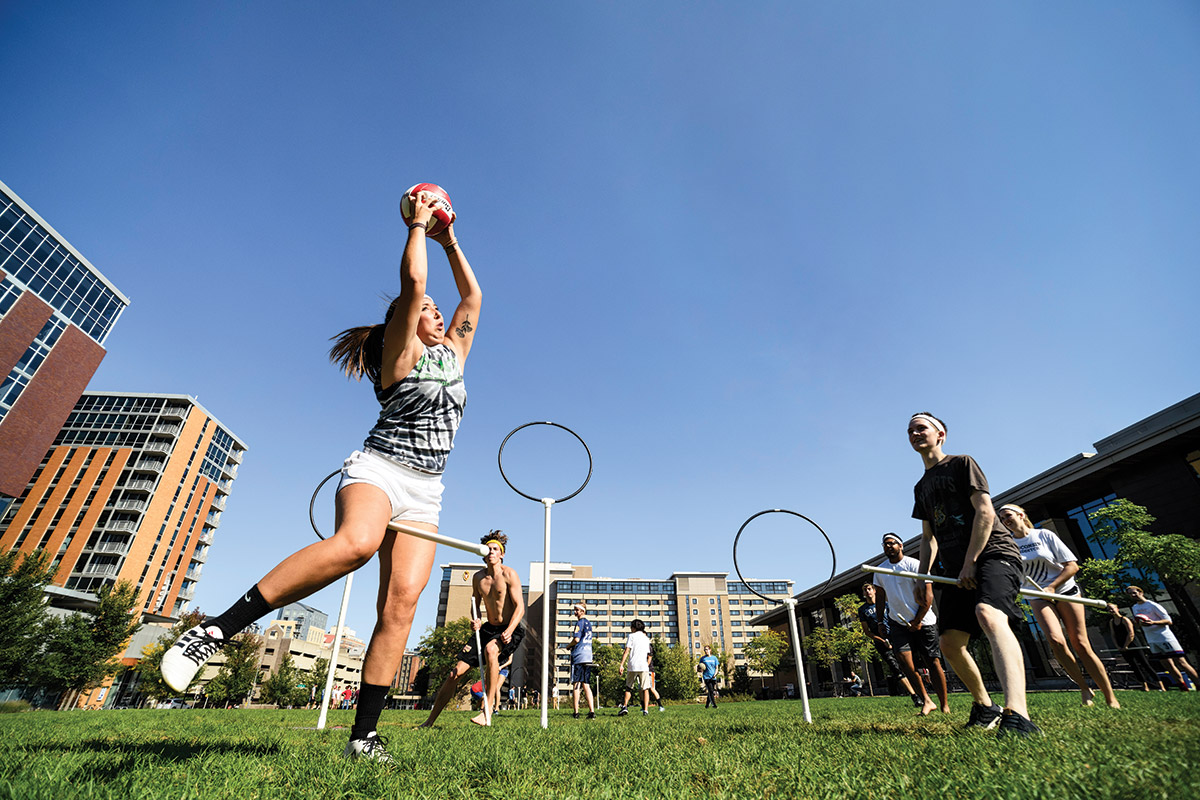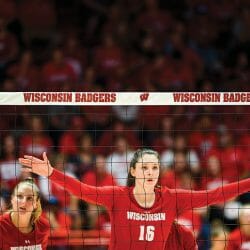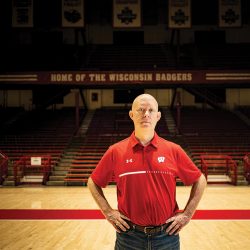Wisconsin Quidditch

“[Defenders] don’t always necessarily look at [the women], even if they’re standing wide open in the backfield,” says UW chaser Alison Pujanauski x’20 (pictured). “So it kind of makes you a secret weapon.”
On a chilly fall evening, the Wisconsin Quidditch team is trying to sell its game to the newest recruits: a pair of students who happened to be tossing a football on the Gordon Dining and Event Center lawn.
“It’s just like that, but with a volleyball,” one of the players shouts over to them. Her teammates chime in: it’s a combination of many sports, including rugby, dodgeball, basketball, and tag. They brag that a former UW football player has even joined their ranks.
Quidditch looks like organized chaos. Words can only start to describe it; YouTube videos do it much better. There are three chasers, who score points by passing and throwing a volleyball — or quaffle — through the opponent’s goals (three hoops propped up with PVC piping). There’s a keeper, who serves as the goalie and blocks scoring attempts. There are two beaters, who throw dodgeballs — or bludgers — at opponents to briefly knock them out of the game. Later on, there’s a seeker, who attempts to end the match and score a bounty of points by catching the snitch, a tennis ball wrapped in a sock dangling off the backside of an impartial runner. (Yes, quidditch is a contact sport.) Oh, and all the players must hold a PVC pipe — or broom — between their legs at all times.
“Wait.” One of the recruits reaches an epiphany: “Is this, like, the Harry Potter thing?”
Twenty years after the U.S. release of the first Harry Potter book, quidditch — sans the wizardry and magic — is still found on many college campuses. “We’re working on the flying,” says a deadpan Chris Noble PhDx’20, president of Wisconsin Quidditch.
The human — or muggle — version of quidditch was created in 2005 by imaginative students at Middlebury College in Vermont. In those early days, it stayed as true as humanly possible to author J. K. Rowling’s once fictional sport, with players using actual brooms and wearing capes. Quidditch has since evolved into an international phenomenon, with several governing bodies, a major league in the United States, and a world cup featuring nearly 30 countries. There are more than 150 college and community teams nationwide.
Quidditch is a rare coed sport. No more than four of the six active players (or five of the seven, when the seeker enters) can identify as the same gender. While intense and competitive on the pitch, the sport is known for its congenial spirit among players and teams. “There seemed to be so much animosity in some of the [other] sports that I tried to play,” Noble says.
The game first arrived at UW–Madison in 2009, when Nikki Powers ’10 and Mary Howard ’13 established a student organization. The club vanished after a year or two, but its Facebook page remained. Noble — who began playing quidditch in his native United Kingdom — arrived on campus in 2015. After posting on the Facebook page, he eventually mustered up enough interest to revive the squad. Around 20 players now make up the roster and compete against nearby schools, including Marquette, Loyola, and Columbia College. Last year, the team qualified for the Midwest regional tournament for the first time but fell short of nationals. The tournament was held at Breese Stevens Field in Madison.
As practice unfolds, it’s easy to tell the veterans from the beginners. Newer players often fall to temptation, channeling their inner Steph Curry and futilely chucking quaffles from 30 feet away. The veteran players strategically and patiently align, pass, and weave until they’re in Giannis Antetokounmpo dunking range. Skilled players can momentarily move with their brooms tightly tucked between their legs, freeing up two hands for catching and throwing.
It’s clear that the athletes take this game seriously, even if some passersby don’t. During practice, a few students on their way to the dining hall sneak a Snapchat or point and laugh with their friends. The Harry Potter charm comes attached with a nerdy stigma. But the longer you watch quidditch, the more you notice the feats of athleticism and teamwork and less the quirks of its fantasy origin.
Perhaps the best description for quidditch is that it’s simply a sport — as real as any other.
Published in the Winter 2018 issue



Comments
No comments posted yet.